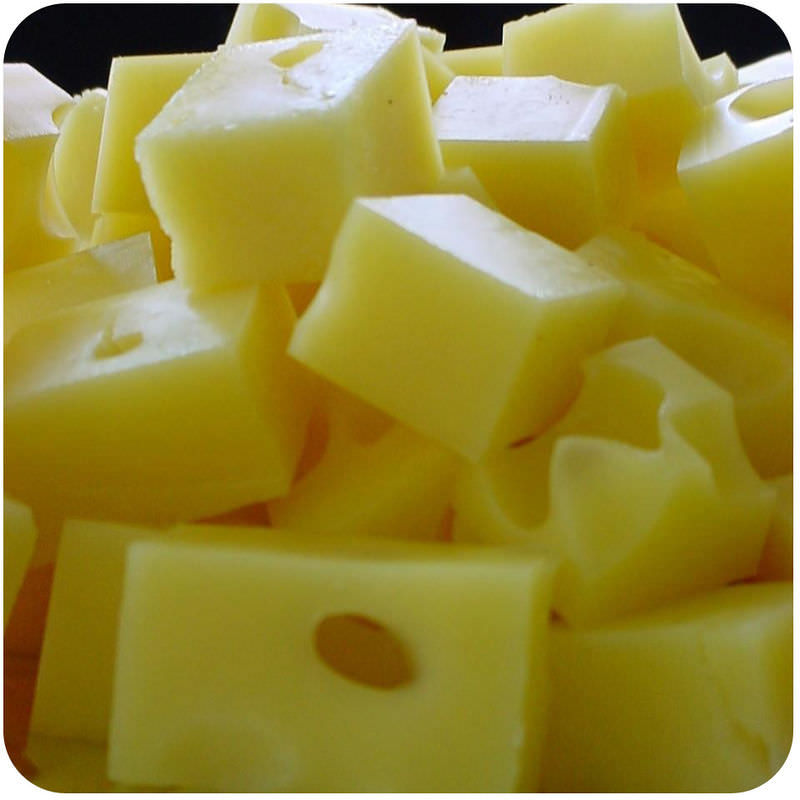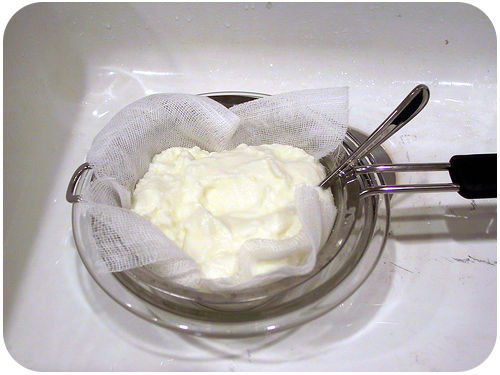5.5 细菌和人类
章节大纲
-
Where does cheese come from?
::奶酪从哪里来的?Bacteria are often used to make cheese from milk. But making foods is not the only beneficial role of bacteria. For example, they also play an essential role in your gut!
::细菌通常用来用牛奶做奶酪。但是,制造食物并不是细菌的唯一有益作用。例如,细菌在你的肠胃中也起着必不可少的作用!Helpful Bacteria
::帮助细菌Can we survive without bacteria? Could bacteria survive without us? No and yes. No, we could not survive without bacteria. And yes, bacteria could survive without us.
::没有细菌我们活不下去?没有细菌我们活不下去吗?没有细菌我们活不下去?没有细菌我们活不下去。没有细菌我们活不下去。没有细菌我们活不下去。没有细菌我们活不下去。Foods
::食品食品Bacteria can be used to make cheese from milk. The bacteria turn the milk sugars into lactic acid. The acid is what causes the milk to curdle to form cheese. Bacteria are also involved in producing other foods. Yogurt is made by using bacteria to ferment milk ( Figure ). Fermenting cabbage with bacteria produces sauerkraut.
::细菌将牛奶糖转化为乳酸。酸是导致牛奶卷缩形成奶酪的原因。细菌也参与生产其他食品。酸是用细菌制成的发酵奶(图 ) 。用细菌制成的卷心菜与细菌产生酸酸。酸是导致牛奶卷缩形成奶酪的原因。细菌也参与生产其他食品。酸是用细菌制成的。酸是用细菌制成的发酵奶(图 ) 。用细菌发酵卷心菜产生酸酸。Yogurt is made from milk fermented with bacteria. The bacteria ingest natural milk sugars and release lactic acid as a waste product, which causes proteins in the milk to form into a solid mass, which becomes the yogurt.
::酸奶是用用细菌发酵的牛奶制成的,细菌摄入天然奶糖,释放液化酸作为废物,导致牛奶中的蛋白质形成固体质量,成为酸奶。Medicines
::医药药品In the laboratory, bacteria can be changed to provide us with a variety of useful materials. Bacteria can be used as tiny factories to produce desired chemicals and medicines. For example, insulin , which is necessary to treat people with , can be produced using bacteria.
::在实验室中,细菌可以改变,为我们提供各种有用的材料。 细菌可以用作小型工厂,生产理想的化学品和药品。 比如,治疗病人所必需的胰岛素可以使用细菌生产。Through the process of transformation, the human gene for insulin is placed into bacteria. The bacteria then use that gene to make a protein . The protein can be separated from the bacteria and then used to treat patients. The mass production of insulin by bacteria made this medicine much more affordable. During transformation, bacteria can take up any from the environment. Therefore, transformation allows scientists to insert any DNA into a bacteria, potentially producing many different proteins. This makes the bacteria greatly useful to people.
::通过转化过程,胰岛素的人类基因被植入细菌。细菌然后利用这种基因来制造蛋白质。蛋白质可以与细菌分离,然后用来治疗病人。细菌大规模生产胰岛素使这种药物更加负担得起。在转化过程中,细菌可以从环境中吸收任何生物。因此,转化可以让科学家将任何DNA插入细菌,从而产生许多不同的蛋白质。这使得细菌对人类非常有用。Digestion
::文摘Bacteria also help you digest your food. Several species of bacteria, such as E. coli , are found in your digestive tract. In fact, in your gut, bacteria cells greatly outnumber your own cells!
::细菌也帮助你消化食物。在你的消化道中发现了一些细菌种类,比如E. 肉里。事实上,在你的肠胃中,细菌细胞的数量大大超过自己的细胞!Decomposers
::混解器Bacteria are important in practically all because many bacteria are decomposers . They break down dead materials and waste products and recycle nutrients back into the environment. The recycling of nutrients, such as nitrogen, by bacteria, is essential for living organisms . Organisms cannot produce nutrients, so they must come from other sources.
::细菌在几乎所有情况下都很重要,因为许多细菌是分解体。它们分解了死亡物质和废品,并将养分循环到环境中。 细菌回收养分,如氮,对于生物体至关重要。 生物体不能产生养分,因此它们必须来自其他来源。We get nutrients from the food we eat; plants get them from the soil . How do these nutrients get into the soil? One way is from the actions of decomposers. Without decomposers, we would eventually run out of the materials we need to survive. We also depend on bacteria to decompose our wastes in sewage treatment plants.
::我们从食用的食物中获取养分;植物从土壤中获取养分;这些养分如何进入土壤?一种方法来自脱腐者的行为。没有脱腐者,我们最终会用光我们生存所需的材料。我们还依靠细菌在污水处理厂中分解废物。Harmful Bacteria
::有害细菌aWith so many species of bacteria, some are bound to be harmful. Harmful bacteria can make you sick. They can also ruin food and be used to hurt people.
::有害细菌会害你生病,它们也会破坏食物,用来伤害人。Diseases
::疾病 疾病 疾病There are also ways that bacteria can be harmful to humans and other animals . Bacteria are responsible for many types of human illness, including:
::还有细菌对人类和其他动物有害的方式。-
Strep throat
::喉喉管 -
Tuberculosis
::肺结核 -
Pneumonia
::肺炎 -
Leprosy
::麻风病 -
Lyme disease
::莱姆病
Luckily most of these can be treated with antibiotics , which kill the bacteria. It is important that when a medical doctor prescribes antibiotics for you, you take the medicine exactly as the doctor tells you. You need to make sure the bacteria is killed.
::幸运的是,大部分的抗生素都可以用抗生素治疗,这些抗生素可以杀死细菌。重要的是,当医生为您开具抗生素时,你必须照医生告诉你的那样服用药物。你需要确保细菌被杀死。Food Contamination
::食品污染Bacterial contamination of foods can lead to digestive problems, an illness known as food poisoning . Raw eggs and undercooked meats commonly carry the bacteria that can cause food poisoning. Food poisoning can be prevented by cooking meat thoroughly, which kills most microbes, and washing surfaces that have been in contact with raw meat. Washing your hands before and after handling food also helps prevent contamination.
::细菌对食物的污染可导致消化问题,一种称为食物中毒的疾病。生蛋和烹饪不足的肉通常含有可能导致食物中毒的细菌。 食品中毒可以通过彻底烹饪肉类来预防,因为肉类杀死了大多数微生物,洗洗与生肉接触的表面。 在处理食物之前和之后洗手也有助于防止污染。Weapons
::武器武器Some bacteria also have the potential to be used as biological weapons by terrorists. An example is anthrax , a disease caused by the bacterium Bacillus anthracis . Inhaling the spores of this bacterium can lead to a deadly infection, and, therefore, it is a dangerous weapon. In 2001, an act of terrorism in the United States involved B. anthracis spores sent in letters through the mail.
::有些细菌还有可能被恐怖分子用作生物武器,例如炭疽,炭疽是一种由细菌炭疽引起的疾病,吸入这种细菌的颗粒可能导致致命感染,因此是一种危险武器,2001年,美国发生的恐怖主义行动涉及寄信的炭疽螺,寄信寄出。Summary
::摘要-
Bacteria can be used to make foods and medicines.
::细菌可以用来制造食物和药品。 -
Bacteria play an important role in animal digestion.
::细菌在动物消化方面发挥着重要作用。 -
Bacteria recycle nutrients in the environment.
::细菌在环境中循环养分。 -
Bacteria are responsible for many types of diseases in humans.
::细菌是人类多种疾病的根源。 -
Some bacteria can contaminate food and cause food poisoning.
::有些细菌会污染食物,导致食物中毒。 -
Some bacteria have been used as biological weapons by terrorists.
::一些细菌被恐怖分子用作生物武器。
Explore More
::探索更多Use the resources below to answer the questions that follow.
::利用以下资源回答以下问题。Explore More I
::探索更多-
Intestinal Flora: A Virtual Organ
at
(2:15)
::恒温花:虚拟机体(2:15)
-
How does the gut bacteria differ between the small intestine and the large intestine?
::小肠和大肠之间 肠道细菌有什么不同? -
What can happen if something causes a reduction of "good" bacteria in your gut?
::如果某事导致你胃部的"好"细菌减少 会怎样呢? -
How do the number of bacterial cells in your intestines compare to the total number of cells in your body?
::肠子中的细菌细胞数量与身体中的细胞总数相比如何?
Explore More II
::探索更多情况二-
Gut Microbes in Early Life Have Effect on Adult Emotions
at
(1:15)
::早期生命中的Gut微生物对成人情感有影响(1:15)
-
What is one of the uses of serotonin in the body?
::体内血清素的用途之一是什么? -
What have scientists discovered about the relationship between gut bacteria and serotonin?
::科学家发现了什么 关于肠道细菌和血清素的关系? -
What do scientists hope to do with this information?
::科学家们希望用这些信息做什么?
Review
::回顾-
How are bacteria helpful in ecosystems?
::细菌如何有助于生态系统? -
How are bacteria beneficial to your health?
::细菌对健康有何好处? -
List two foods produced with the help of bacteria.
::列出两种在细菌帮助下生产的食品。 -
What are three examples of diseases caused by bacteria?
::细菌引起的疾病的三个例子是什么? -
How can you prevent food poisoning?
::如何防止食物中毒? -
How are bacterial diseases treated?
::如何治疗细菌疾病?
-
Strep throat

